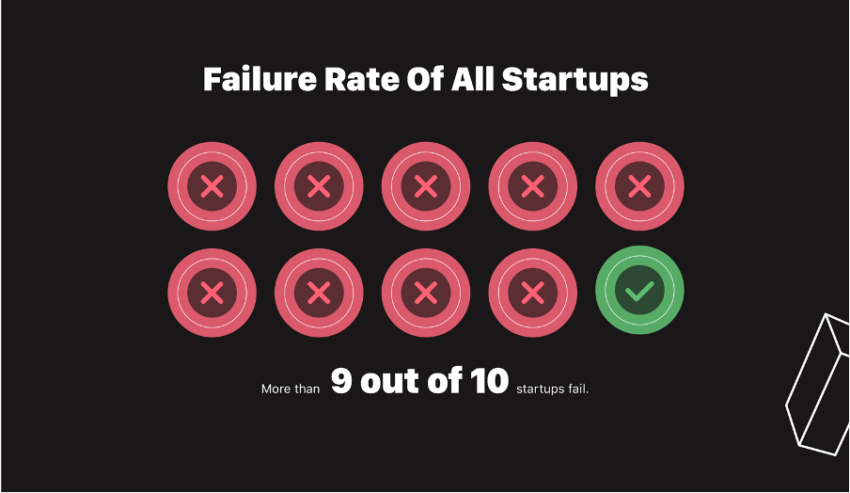Why do Blockchain and crypto startups have high failure rates? The answer may lie in different factors beyond funding. Mario Nawfal spoke exclusively with BeInCrypto to share his thoughts.
Blockchain and crypto startups have witnessed a significant rise over the years. But only a few projects become success stories. It’s no secret starting and successfully launching a blockchain project is challenging.
When it comes to ever-evolving and complex technology, getting a project off the ground takes more than just a great idea — it requires a dedicated team with the vision, expertise, and resources to succeed.
Startups Have a High Failure Rate
Blockchain and crypto startups have garnered much attention in recent years as they offer a new way of doing things in the financial world. These startups operate in a complex and rapidly changing environment and face unique challenges that traditional businesses may need to encounter. As a result, the failure rate of blockchain and crypto startups tends to be higher than other businesses.
In fact, 9 out of 10 startups in the traditional or decentralized finance domain see the exit route.

According to a Deloitte report, less than 10% of all blockchain startups succeed, and a blockchain project’s average life span is about one year. BeInCrypto conducted a survey on Reddit regarding the failure. While there were many responses, one of the replies reads:
“The reason for this isn’t a lack of money. Many blockchain startups fail because they take too long to build. We need to do a better job of getting companies on the right track for success quickly before they lose momentum. Money can help startups get going, but it eventually dries up, and this is directly correlated with the amount of time it takes a project to get up and run. If projects had engineering resources and expertise from day one, they could focus on building their product and save precious time and funds.”
Here are some of the key reasons why blockchain and crypto startups have high failure rates:
Lack of Regulation
One of the main challenges facing blockchain and crypto startups is the need for more regulation in the industry. Since the industry is relatively new, companies must follow a few established rules and regulations. This creates uncertainty and makes it difficult for companies to know how to navigate the regulatory landscape.
Blockchain and crypto startups face legal and compliance issues without clear regulations, leading to fines or even closure. In addition, investors may hesitate to invest in a company operating in a regulatory gray area, making it harder for startups to raise funds.
High Competition
Another reason for the high failure rate of blockchain and crypto startups is the industry’s high competition level. As the industry has grown, more and more companies have entered the market, making it more difficult for new startups to gain traction.
The competition is not just limited to other blockchain and crypto startups but also traditional financial institutions, such as banks and credit card companies. These established players are also looking to enter the blockchain and crypto space, which can make it even more challenging for startups to compete.
Lack of Adoption
Blockchain and crypto startups often need help with adoption, as the technology is still in its early stages. While blockchain and crypto offer many benefits, such as transparency and security, they have yet to be widely adopted by the general public.
This lack of adoption can make it difficult for blockchain and crypto startups to generate revenue, as they may need help finding customers willing to use their products or services.
In addition, the lack of adoption can make it more challenging for startups to raise funds, as investors may be hesitant to invest in a technology that has yet to be widely adopted.
Technical Challenges
Blockchain and crypto startups face various technical challenges like scalability and security. Blockchain technology is still in its early stages, and developers are still figuring out how to make it more efficient and secure.
These technical challenges can make it more difficult for startups to create products or services that are reliable and secure. In addition, fixing technical problems can be time-consuming and expensive, which can drain a startup’s resources.
Lack of Talent
Blockchain and crypto startups often need help finding the talent they need to succeed. The industry is still relatively new, meaning only a few experienced professionals have the necessary skills to work there.
In addition, the industry is highly competitive, making it more challenging for startups to attract top talent. This can be especially true for startups that can offer additional compensation or benefits over more established companies.
Market Volatility
Finally, blockchain and crypto startups face the challenge of market volatility. The price of cryptocurrencies can fluctuate wildly, making it difficult for startups to plan and budget.
Market volatility can also affect the demand for blockchain and crypto products and services. For example, during a downturn, customers may be less willing to invest in blockchain and crypto startups, making it more challenging for these companies to generate revenue.
Concluding; blockchain and crypto startups have high failure rates due to various factors, including the lack of regulation, increased competition, lack of adoption, technical challenges, lack of talent, and market volatility.
To elaborate further, Mario Nawfal, the Host of Twitter’s Largest Spaces and CEO at IBCgroup, spoke to BeInCrypto. Nawfal exclusively shared quotes regarding the stated scenario, asserting that he wasn’t surprised by the failure rate. Considering crypto is a risky asset, the failure rate is high. We asked Nawfal why, and he cited the basic rule of supply and demand.
“We don’t need a million games right now. There are not enough players. There are more games than players in the bear market. It’s capitalism; let the fittest survive. So you have different games trying to do the same thing. You have different DeFi projects trying to do the same thing. You’ve got to accept it. You gotta fail.”
Further added:
“I’ll never launch a crypto project because I’m just too scared, considering the odds are against me. I’ll rather invest in many (projects).”
While these challenges are significant, startups still have opportunities to succeed in the industry. Several factors can help grow the startups in the ecosystem, as covered by BeInCrypto in a Jan. 31 report.
Disclaimer
Following the Trust Project guidelines, this feature article presents opinions and perspectives from industry experts or individuals. BeInCrypto is dedicated to transparent reporting, but the views expressed in this article do not necessarily reflect those of BeInCrypto or its staff. Readers should verify information independently and consult with a professional before making decisions based on this content. Please note that our Terms and Conditions, Privacy Policy, and Disclaimers have been updated.


